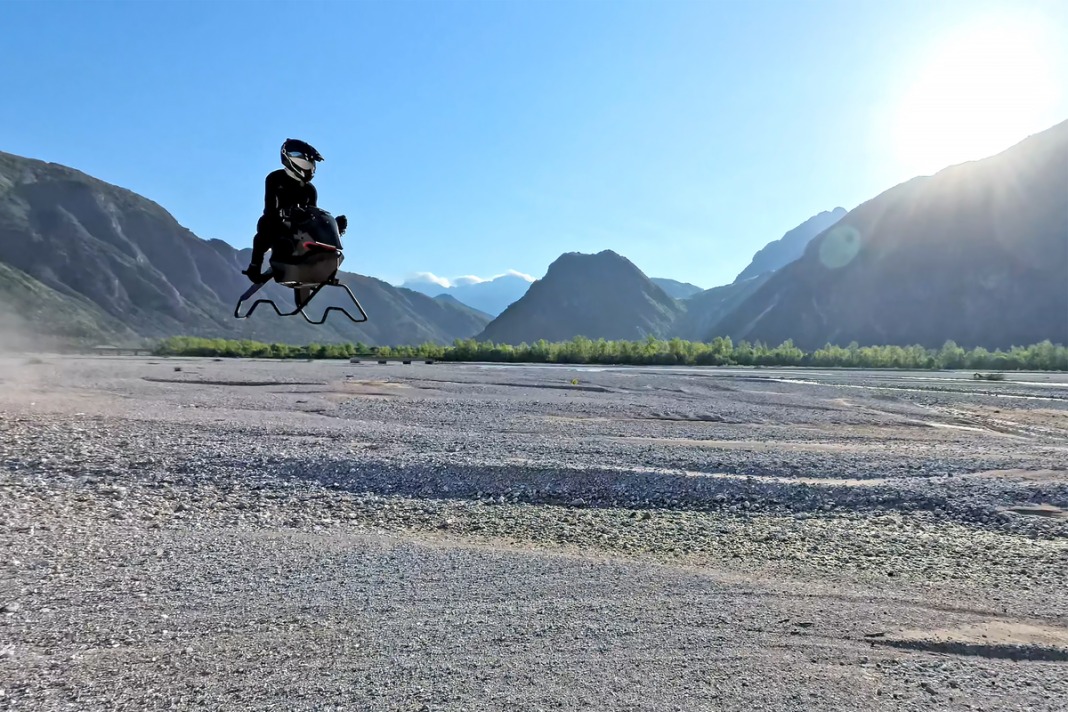[ad_1]
The new Volonaut Airbike promises to be an exciting new option for personal air mobility.
Designed by Polish inventor and entrepreneur Tomasz Patan, the Volonaut looks like something from “Star Wars.” Fans of the movie “Return of the Jedi” might see similarities between the Volonaut and the hoverbikes in the film.
Unlike personal eVTOL aircraft with protective frames and propellers, the Volonaut has an open-air configuration and no visible propellers.

Jet Propulsion Powers Volonaut Personal Air Mobility Vehicle
One of the key things that stands out about the Volonaut Airbike is that it is powered by jet propulsion instead of propellers like other personal air mobility designs. It carries a single pilot without a cage or protective frame. Instead, the pilot sits on a seat like on a motorcycle. Patan said its sleek, “minimalistic design” gives the pilot an unobstructed 360-degree view. The design will also enable it to operate through narrow spaces.
According to Patan, the Volonaut Airbike is seven times lighter than a typical motorcycle, thanks to carbon fiber materials and a 3D printing manufacturing process.
Stabilization System Will Keep Wingless Volonaut Level
The Volonaut can reach a speed of 124 miles per hour. Despite having no wings, it maintains stable flight due to its proprietary stabilization system and flight computer. It can take off and land vertically and can even hover.

The company has not released many details on how it will operate, but it appears that pilots will control it with two joysticks and by leaning or tilting it like on a motorcycle.
According to Volonaut, “The unique riding position…helps the rider to quickly become one with the flying machine and provides the sensation of complete freedom.”
Instead of traditional landing gear with tires, the Volonaut Airbike personal air mobility vehicle rests on a pair of struts, basically tubular components.
Video of Prototype Shows Capabilities of Volonaut Airbike

While Patan has not provided a date when the Volonaut might be available for purchase, in May 2025, the company released a video of a prototype flying and hovering over desert and forest areas. The vehicle looks so striking and different that some wondered if the video, which went viral, was not authentic and if it was made with software. Patan quickly denied this.
He said it’s “as real as it gets, no trickery there, not a bit of AI.” He added that they produced the video with the help of “a great camera and FPV drone operators.”

Volonaut Inventor Also Designed The Jetson One EVTOL Aircraft

The Volonaut Airbike is not the first personal air mobility vehicle Patan has designed. He also invented the Jetson One EVTOL aircraft. Like the Volonaut, it only carries one pilot, but in this case, the single seat is configured to lean back like a Formula One race car. The Jetson One has a cage or “safety cell” that protects the pilot. It also has eight brushless electric motors and eight propellers, and it can maintain flight if it loses one. The aircraft weighs 253 pounds with batteries installed, has a maximum speed of 63 mph, and has a 20-minute flight time.

Jetson advertises the aircraft as “the first affordable EVTOL on the market.” It also claims that anyone can learn to fly it in just five minutes and that no pilot’s license will be required to fly it in the United States.
Jetson Taking Down Payments For 2026 Deliveries
Further along in development than the Volonaut personal air mobility vehicle, the Jetson One will be in production soon, and the first deliveries to customers will be in 2026. They are currently taking down payments of $8000 towards a final payment of $120,000. Customers interested in personal air mobility vehicles might soon be able to decide between a race car-style Jetson One or what Patan calls the “superbike for the skies:” the Volonaut Airbike.
[ad_2]
Source link


